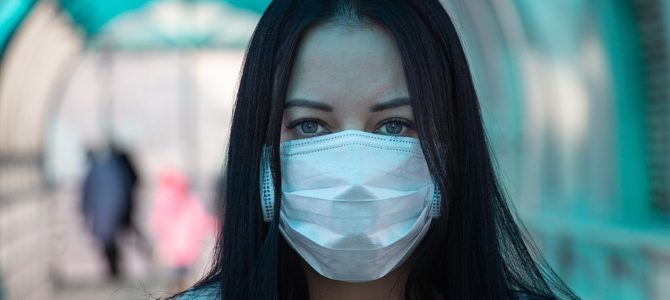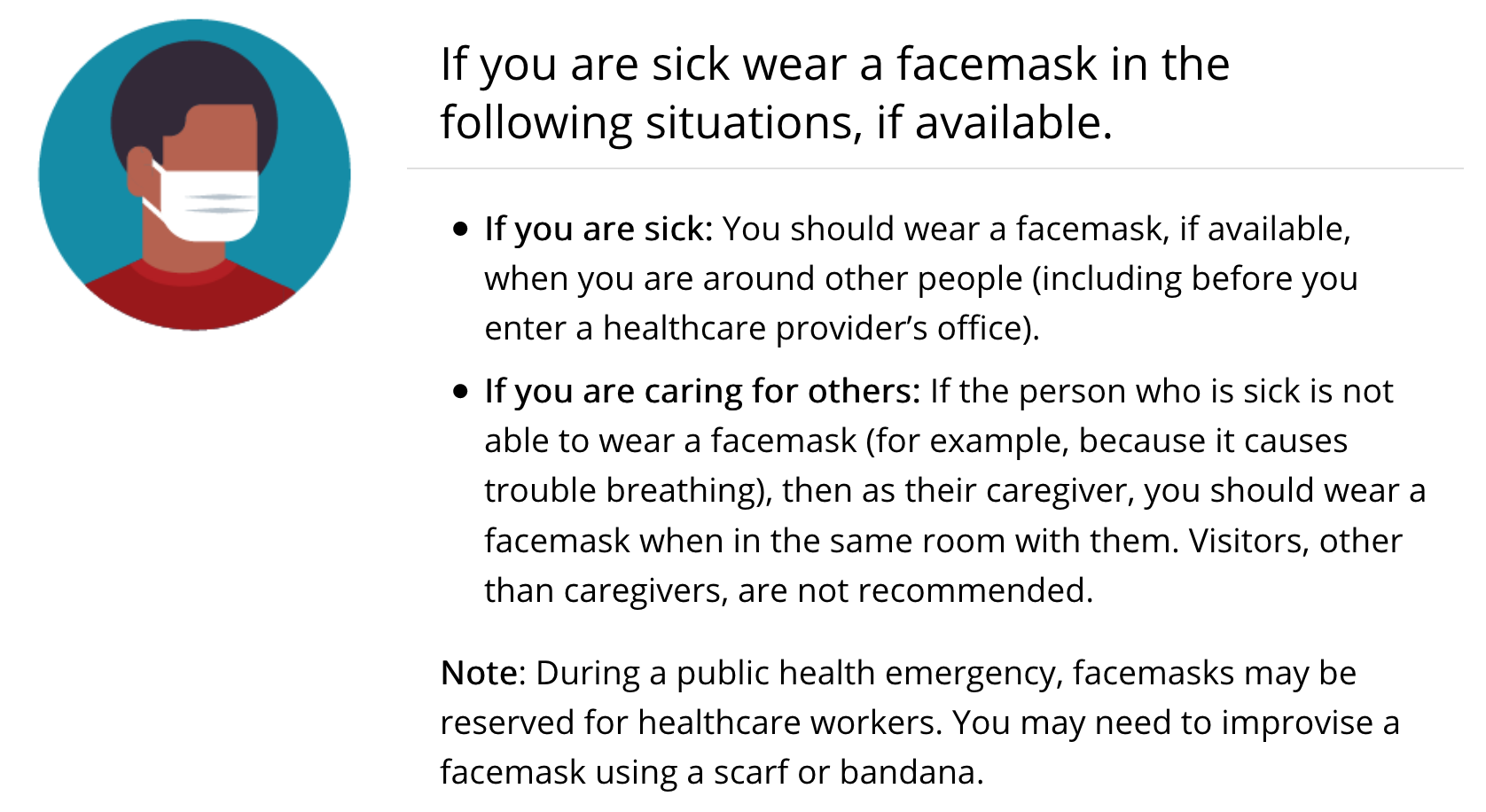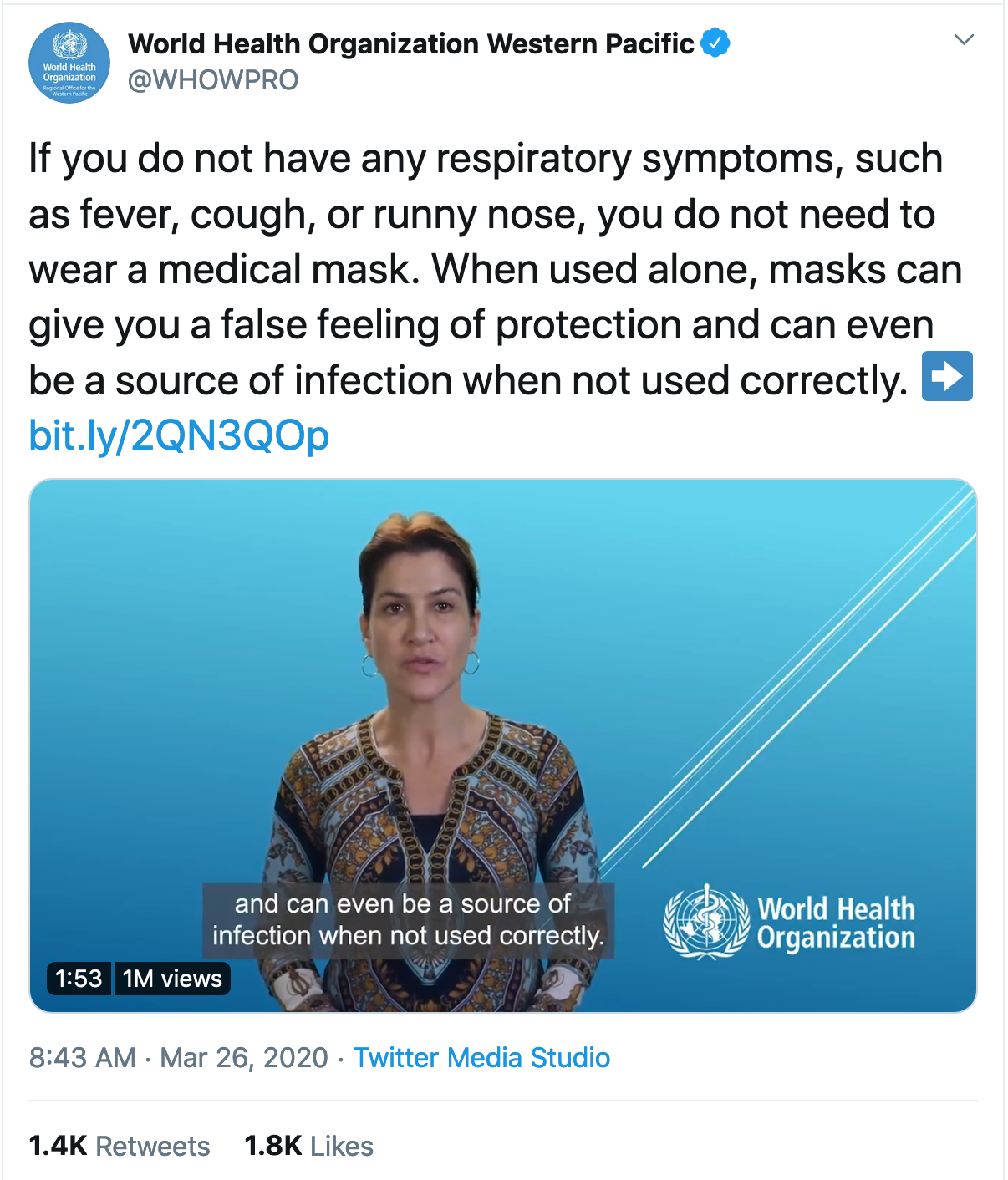
“Actually, masks aren’t helpful for anyone who isn’t used to wearing them” is a confusing statement I heard repeatedly from members of the media, government officials, and know-it-all friends who were watching cable news in the early weeks of the Wuhan coronavirus outbreak.
As Americans slowly woke up to the seriousness of the pandemic, and their own lack of preparedness, our media and government elites discouraged the general public from stocking up on masks in an effort to preserve supplies for health-care workers on the front lines. Whether they genuinely believed masks would be useless for everyday, non-medical use, or they were bracing for shortages to come, their lies have now damaged both the public’s trust in any future top-down guidance, and backfired on their efforts to “flatten the curve.”
The U.S. surgeon general, Dr. Jerome Adams, tweeted on February 29, “STOP BUYING MASKS!”
https://twitter.com/Surgeon_General/status/1233725785283932160
On Fox News in early March, Adams told viewers that “you can actually increase your risk of getting a respiratory disease like coronavirus” if you wear a mask improperly.
On March 1, both Vice President Mike Pence and CNN Anchor Jake Tapper pleaded with viewers not to buy masks. “It is not necessary for Americans to go out and buy masks,” Pence said.
“It’s not going to do anything for you. It’s the people who actually have coronavirus that have the masks, need the masks,” Tapper said.
New York City’s official coronavirus guidelines instruct New Yorkers, who are at the epicenter of the pandemic in the United States, that they “do not need to wear a face mask if you are not feeling sick.”

The U.S. Centers for Disease Control and Prevention (CDC) is still advising Americans that they should wear a mask only if they are sick or are caring for someone who is sick.

The World Health Organization warned just a few days ago that “masks can give you a false feeling of protection and can even be a source of infection when not used properly.”

“No, You Do Not Need Face Masks To Prevent Coronavirus—They Might Increase Your Infection Risk,” says a Forbes headline. “Seriously, Stop Buying Face Masks,” pleaded a senior writer at The Cut. “Why experts say healthy people should stop wearing masks,” reads a local Denver news report. “CDC says surgical masks won’t protect you from the coronavirus,” reads another local report in Washington state.
Government and health care officials worked hand in hand with a compliant media to get their message across, but at what cost? In early March, the Department of Health and Human Services said the country had only about 35 million of the 3.5 billion high-grade N95 respirators needed in the event of a full-blown pandemic. So what did we really save, if even after all the “no mask” messaging, the government is still having to ask companies to ramp up production anyway? Could infection rates have been reduced if the general public was not warned against wearing masks?
Scientists are beginning to weigh in with research showing that if we all wear masks, people unknowingly infected with the coronavirus would be less likely to spread it. This advice, which is seemingly obvious, makes much more sense than the confusing message that ordinary people couldn’t possibly figure out how to wear a mask properly, or that masks somehow only work when worn by health care providers.
Jeremy Howard, a research scientist at the University of San Francisco, wrote in the Washington Post that at least 34 scientific papers have found that basic masks, meaning even a cut up T-shirt, can be effective in reducing virus transmission in public.
“Studies have documented definitively that in controlled environments like airplanes, people with masks rarely infect others and rarely become infected themselves, while those without masks more easily infect others or become infected themselves,” Howard writes.
Yes, U.S. health-care workers are short on masks and they desperately need them, and of course healthy people should not be stockpiling them, especially N95 masks. But studies have also found that even surgical masks, the ones that do not have a tight fitted seal, can “reduce exposure to aerosolised infectious influenza virus.” That sounds better than no mask at all. The combination of masks and hand washing have also been found to reduce infection rates.
Lest it even need to be said, face masks are not a novel concept yet to be proven. This is not some new technology we are convincing society to get on board with. We know they work. It’s why they’re worn by health-care workers, people with compromised immune systems, and even WHO officials during COVID-19 public health briefings.
Now, our intelligentsia are sowing more confusion and distrust as they back-peddle on their previous confusing instructions to not take this obvious precaution for yourself and those around you. On Monday, President Donald Trump said he could see a recommendation, proposed by former Food and Drug Administration head Scott Gottlieb, that all Americans wear masks. “We are not going to be wearing masks forever, but it could be for a short period of time after we get back into gear. I could see something like that happening for a period of time,” he said.
In a matter of days, masks have gone from “source of infection when not used properly” to “recommended for all Americans.” So do we wear masks now, or not? Does it matter what kind? If I display symptoms of coronavirus, how long should I wait before being tested? Can I treat it at home, and for how long? It’s easy to see how the botched messaging on such a simple precaution early on will now have bigger consequences for other guidelines delivered to us down this long road.
Now that it seems obvious the surgeon general was wrong to say I don’t need a mask at the grocery store, should I trust his next instruction that seems counter-intuitive? What about what I hear from the CDC, politicians, the media, or neighborhood gossip? Is there even a difference between them all anymore?









